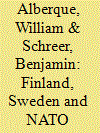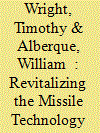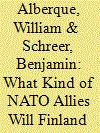| Srl | Item |
| 1 |
ID:
184985


|
|
|
|
|
| Summary/Abstract |
Russia’s war against Ukraine has suddenly made NATO membership for Finland and Sweden highly likely. It would end their long-standing postures of ‘armed neutrality’. Their accession would constitute a major shift in European security. Properly managed, it could produce a net benefit. Both nations would be security providers, with highly capable forces. They would make significant contributions to burden-sharing among the allies and enhance NATO’s ability to modernise its defence planning and capability development. Their membership would also bolster NATO deterrence by complicating Russian military planning in the geostrategically evolving Baltic Sea region. Dealing with Russia in that region, the Arctic and the High North would also become more central to NATO’s strategy and posture.
|
|
|
|
|
|
|
|
|
|
|
|
|
|
|
|
| 2 |
ID:
183351


|
|
|
|
|
| Summary/Abstract |
More states than ever have cruise and ballistic missiles in their arsenals. In 1987, for instance, only three states—the United Kingdom, the United States, and the Soviet Union—possessed cruise missiles. Twenty-three states and one nonstate actor possess them today. The demand for these systems is partly driven by their increasing utility, resulting from exponential improvements in survivability, accuracy, and speed. Missile proliferation has been accelerated by the spread of enabling technologies that have allowed more actors to overcome previous structural hurdles.
|
|
|
|
|
|
|
|
|
|
|
|
|
|
|
|
| 3 |
ID:
188457


|
|
|
|
|
| Summary/Abstract |
Barring a Turkish veto, Finland and Sweden will join NATO as full members prior to the Alliance’s Vilnius Summit in June 2023. Both confront several political, military and defence-industrial choices regarding their membership, with different benefits and opportunity costs for each country and the Alliance depending on whether they select a low, medium or high level of ambition. Both are likely to adopt a medium level of ambition, opening up a range of new areas for cooperation with other allies and strengthening the Alliance as a whole. A high level of ambition is not likely in the short term, given the substantial political, financial and personnel costs it would entail. Nevertheless, it could eventually materialise.
|
|
|
|
|
|
|
|
|
|
|
|
|
|
|
|